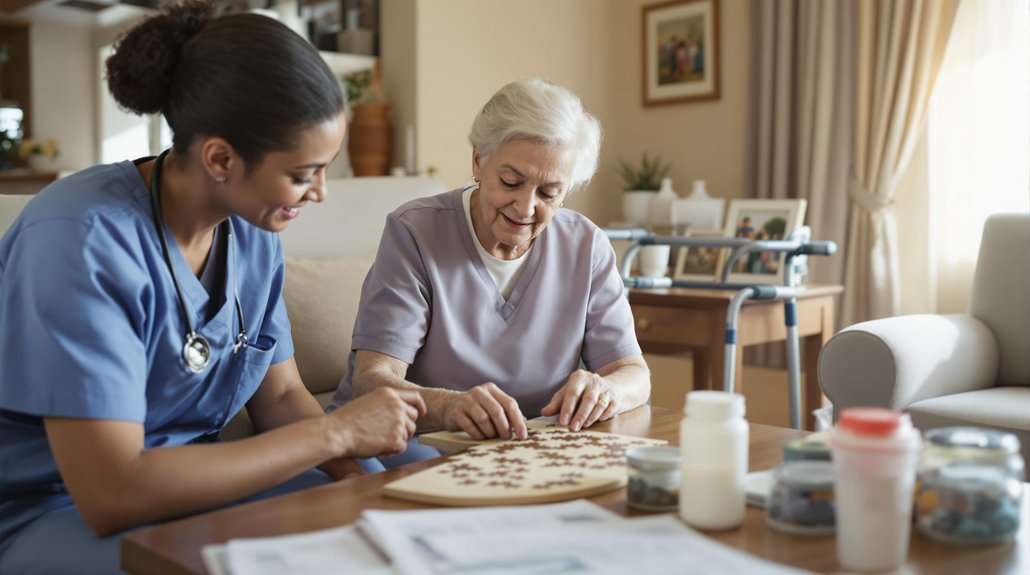You can provide effective dementia care at home with proper planning and preparation. You’ll need to create a safe environment by removing hazards, establishing daily routines, and learning essential caregiving skills. Building a support network, managing finances, and practicing self-care are vital for sustainable home care. While it’s challenging, understanding the right strategies and resources will help you provide quality care for your loved one.
Assessing Home Care Suitability for Your Loved One
How do you know if home care is the right choice for your loved one with dementia? Start by conducting a thorough home assessment to evaluate safety, accessibility, and needed modifications. Consider factors like stairs, bathroom setup, lighting, and potential hazards that could affect your loved one’s well-being.
Next, complete an honest caregiver evaluation to determine if you’re prepared for this responsibility. Think about your physical and emotional capacity, time availability, and support network.
You’ll need to assess whether you can manage daily tasks, medication schedules, and emergency situations. Also consider your loved one’s current stage of dementia and their specific care requirements.
If you identify gaps in either the home environment or caregiving capabilities, don’t worry. Many solutions exist, from home modifications to professional support services that can help you provide effective care.
Remember that dementia-certified caregivers can provide essential cognitive support and safety monitoring while allowing your loved one to maintain familiar routines at home.
Creating a Safe and Dementia-Friendly Environment
Once you’ve decided to provide home care, transforming your living space into a dementia-friendly environment becomes essential for your loved one’s safety and well-being.
Start by implementing dementia friendly design principles like removing tripping hazards, installing handrails, and ensuring adequate lighting throughout the home.
Creating a safe home environment begins with removing hazards, adding support rails, and brightening dark spaces.
Make home safety modifications that address specific challenges. Secure dangerous items, install safety locks on cabinets containing chemicals, and remove or cover mirrors that might cause confusion.
Consider using contrasting colors for better visual perception, especially in bathrooms and eating areas. Label important rooms with clear signs and pictures to help with navigation.
Create a calming atmosphere by reducing clutter, maintaining familiar objects, and establishing designated spaces for meaningful activities your loved one enjoys.
Working with trained dementia caregivers can help establish effective safety protocols and routines while providing expert guidance on home modifications.
Essential Skills for Family Caregivers
While medical knowledge is important, successful dementia care depends heavily on developing practical caregiving skills. You’ll need to master key communication techniques, provide emotional support, and handle daily challenges with patience and understanding.
| Skill Area | Why It Matters | How to Develop |
|---|---|---|
| Communication | Reduces frustration | Use simple words, speak slowly, maintain eye contact |
| Personal Care | Preserves dignity | Learn proper lifting, bathing, and dressing techniques |
| Safety Management | Prevents accidents | Monitor activities, remove hazards, install safety devices |
| Emotional Support | Maintains connection | Practice active listening, validate feelings, stay calm |
| Time Management | Prevents burnout | Create routines, prioritize tasks, accept help from others |
Your role extends beyond basic care – you’re creating a supportive environment where your loved one can maintain dignity and quality of life despite their condition. Respite care services can provide essential breaks to prevent family caregiver exhaustion and burnout.
Daily Routines and Activities Management
Establishing consistent daily routines can provide essential structure and security for someone with dementia. You’ll want to plan daily activities around your loved one’s best times of day, considering when they’re most alert and cooperative.
Schedule meals, personal care, and leisure activities at regular times while maintaining routine flexibility to accommodate changing needs.
Keep activities simple and meaningful. You can break down daily activities into manageable steps and offer gentle guidance as needed.
Consider incorporating familiar tasks like folding laundry, gardening, or looking through photo albums. It’s important to balance structure with adaptability – some days may require adjustments based on your loved one’s mood or energy level.
Remember that maintaining a predictable schedule helps reduce anxiety and confusion while promoting a sense of independence and accomplishment.
Compassionate caregivers can assist with implementing and maintaining these daily routines while providing essential emotional support and companionship.
Building a Support Network and Resources
Taking care of someone with dementia requires more than just individual effort – you’ll need a reliable support system to maintain your own well-being and provide the best possible care.
Caregiving for dementia patients isn’t a solo journey – building a strong support network is vital for both caregiver and recipient.
Start by connecting with local support resources, including dementia care organizations, healthcare providers, and caregiver support groups. These community connections can offer valuable advice, emotional support, and practical assistance.
You’ll find that other caregivers often share similar experiences and can provide helpful tips for managing challenges.
Consider reaching out to family members, friends, and neighbors who can help with tasks like grocery shopping, household maintenance, or providing respite care.
Don’t hesitate to explore professional services such as adult day care centers, home health aides, or respite care programs.
Remember that accepting help isn’t a sign of weakness – it’s essential for sustainable long-term caregiving.
Specialized respite care services are available specifically for seniors with dementia to ensure they receive appropriate care while family caregivers take necessary breaks.
Managing Medical Care and Medications
A strong support network helps manage one of the most complex aspects of dementia care: medical oversight and medication management. You’ll need to track multiple medications, monitor health changes, and coordinate with healthcare providers regularly.
| Task | Frequency | Tips |
|---|---|---|
| Medication Review | Weekly | Check expiration dates, organize pills |
| Essential Signs | Daily | Record blood pressure, temperature |
| Doctor Visits | Monthly | Keep detailed notes, ask questions |
| Side Effects | Ongoing | Document reactions, report changes |
Remember to use medication organizers, set reminders for dosing times, and maintain an up-to-date list of all prescriptions. Health monitoring involves watching for changes in eating habits, sleep patterns, and behavior. Keep a journal of symptoms and share it with healthcare providers to guarantee proper medical care and medication adjustments when needed.
Addressing Behavioral Changes and Challenges
When caring for someone with dementia, you’ll encounter significant behavioral changes that can be challenging to manage. Understanding behavioral triggers and developing effective communication strategies will help you provide better care while reducing stress for both you and your loved one.
- Watch for triggers like overstimulation, unfamiliar environments, or physical discomfort that may cause agitation or confusion. Remove or modify these triggers when possible.
- Practice clear, simple communication by speaking slowly, maintaining eye contact, and using visual cues to support your words. Don’t argue or correct; instead, validate their feelings and redirect their attention.
- Create a consistent daily routine that provides structure and security. Include familiar activities and quiet times throughout the day to help manage anxiety and reduce challenging behaviors.
Financial Planning for Long-Term Home Care
Managing the emotional and behavioral aspects of dementia care must go hand in hand with sound financial preparation.
You’ll need to assess your current financial situation and explore various insurance options, including long-term care insurance and Medicare supplements, to help cover ongoing expenses.
Start your budget planning early by calculating potential costs for medical supplies, home modifications, and professional caregiving services.
Consider meeting with a financial advisor who specializes in elder care to create a sustainable spending plan.
Don’t forget to investigate local resources, grants, and government assistance programs that might help offset expenses.
Remember to protect your loved one’s assets by securing proper legal documentation, such as power of attorney and healthcare directives.
Having these financial safeguards in place will help you focus on providing quality care without constant worry about monetary constraints.
Self-Care Strategies for Family Caregivers
Taking care of someone with dementia can quickly deplete your physical and emotional reserves, making it essential to prioritize your own well-being.
As a family caregiver, implementing effective self care techniques will help you maintain the strength and resilience needed for this challenging role.
Consider these essential caregiver wellness practices:
- Schedule regular respite breaks by arranging for trusted family members, friends, or professional caregivers to take over while you recharge.
- Join local support groups where you can share experiences, learn coping strategies, and connect with others who understand your journey.
- Maintain your physical health through regular exercise, proper nutrition, and adequate sleep – even small daily wellness routines can make a significant difference in your caregiving stamina.
Understanding When to Consider Alternative Care Options
Despite your best efforts at self-care and managing home care responsibilities, there may come a point when you’ll need to evaluate alternative care arrangements for your loved one with dementia.
Watch for signs that indicate the current care setup isn’t sustainable, such as increased falls, wandering incidents, or your own declining health.
As dementia progression continues, you’ll want to research care options early, before an emergency forces a rushed decision.
Consider adult day care centers, in-home care services, assisted living facilities, or memory care communities. Each option offers different levels of support and supervision.
Conclusion
Caring for someone with dementia at home takes love, patience, and dedication. Some days feel easy and peaceful, like a gentle morning at home, while others bring tough challenges that test your strength. Just like a family working together, you can create a warm, safe space for your loved one with proper planning and the right help. When things get difficult, remember that reaching out for support isn’t a sign of weakness – it’s a sign of wisdom and love.
You don’t have to walk this path alone. Many families face similar challenges, and there are caring professionals ready to stand by your side. Focus Family Care understands your journey and can help make the road ahead easier for both you and your loved one.
If you or a loved one need help, don’t wait. Reach out to Focus Family Care today at (561) 693-1311 or email us at info@focusfamilycare.com.





